- Home
- Bertolt Brecht
Bertolt Brecht: Mutter Courage und ihre Kinder 7 Page 18
Bertolt Brecht: Mutter Courage und ihre Kinder 7 Read online
Page 18
THE OLD MAN right: The valley has belonged to us for centuries.
THE SOLDIER left: What does that mean—for centuries? Nothing belongs to anyone for centuries. When you were young you didn’t even belong to yourself, but to Prince Kazbeki.
THE OLD MAN right: According to the law the valley belongs to us.
THE GIRL TRACTOR DRIVER: The laws will have to be re-examined in any case, to see whether they are still valid.
THE OLD MAN right: That’s obvious. You mean to say it makes no difference what kind of tree stands beside the house where one was born? Or what kind of neighbour one has? Doesn’t that make any difference? We want to go back just to have you next door to our kolchos, you valley-thieves. Now you can laugh again.
THE OLD MAN left, laughing: Then why don’t you listen to what your ‘neighbour’, Kato Vachtang, our agronomist, has to say about the valley?
A PEASANT WOMAN right: We haven’t said anywhere near all we have to say about our valley. Not all the houses are destroyed. At least the foundation wall of the dairy farm is still standing.
THE EXPERT: You can claim State support—both here and there. You know that.
A PEASANT WOMAN right: Comrade Expert, we’re not trading now. I can’t take your cap and hand you another, and say: ‘This one’s better.’ The other one might be better, but you prefer yours.
THE GIRL TRACTOR DRIVER: A piece of land is not like a cap. Not in our country, comrade.
THE EXPERT: Don’t get angry. It’s true that we have to consider a piece of land as a tool with which one produces something useful. But it’s also true that we must recognize the love for a particular piece of land. Before we continue the discussion I suggest that you explain to the comrades of the Galinsk kolchos just what you intend to do with the disputed valley.
THE OLD MAN right: Agreed.
THE OLD MAN left: Yes, let Kato speak.
THE EXPERT: Comrade Agronomist!
THE AGRONOMIST rising. She is in military uniform: Last winter, comrades, while we were fighting here in these hills as partisans, we discussed how after the expulsion of the Germans we could increase our orchards to ten times their former size. I have prepared a plan for an irrigation project. With the help of a dam on our mountain lake, three hundred hectares of unfertile land can be irrigated. Our kolchos could then grow not only more fruit, but wine as well. The project, however, would pay only if the disputed valley of the Galinsk kolchos could also be included. Here are the calculations. She hands the expert a briefcase.
THE OLD MAN right: Write into the report that our kolchos plans to start a new stud farm.
THE GIRL TRACTOR DRIVER: Comrades, the project was conceived during the days and nights when we had to take cover in the mountains and often were without ammunition for our few rifles. Even to get a pencil was difficult.
Applause from both sides.
THE OLD MAN right: Our thanks to the comrades of the Rosa Luxemburg kolchos and to all those who defended our country.
They shake hands and embrace.
THE PEASANT WOMAN left: Our thoughts were that our soldiers—both your men and our men—should return to a still more fertile homeland.
THE GIRL TRACTOR DRIVER: As the poet Mayakovsky said: ‘The home of the Soviet people shall also be the home of Reason!’
The delegates on the right (except the old man) have risen and, with the expert, study the agronomist’s plans. Exclamations such as: ‘Why is there a fall of 66 feet?’—’This rock here is to be dynamited!’—’Actually, all they need is cement and dynamite!’—‘They force the water to come down here, that’s clever!’
A VERY YOUNG WORKMAN right, to the old man, right: They are going to irrigate all the fields between the hills—look at that, Alleko.
THE OLD MAN right: I am not going to look at it. I knew the project would be good. I won’t have a revolver pointed at my chest.
THE SOLDIER: But they are only pointing a pencil at your chest.
Laughter.
THE OLD MAN right. He gets up gloomily and walks over to look at the drawings: These valley-thieves know only too well that we can’t resist machines and projects in this country.
THE PEASANT WOMAN right: Alleko Bereshvili, you yourself are the worst one at new projects. That is well known.
THE EXPERT: What about my report? May I write that in your kolchos you will support the transfer of your old valley for the project?
THE PEASANT WOMAN right: I will support it. What about you, Alleko?
THE OLD MAN right, bent over the drawings: I move that you give us copies of the drawings to take along.
THE PEASANT WOMAN right: Then we can sit down to eat. Once he has the drawings and is ready to discuss them, the affair is settled. I know him. And it will be the same with the rest of us.
The delegates embrace again amidst laughter.
THE OLD MAN left: Long live the Galinsk kolchos and good luck to your new stud farm!
THE PEASANT WOMAN left: Comrades, in honour of the visit of the delegates from the Galinsk kolchos and of the expert we have arranged a play featuring the singer Arkadi Cheidze, which has some bearing on our problem.
Applause.
The girl tractor driver has gone off to fetch the singer.
THE PEASANT WOMAN right: Comrades, your play will have to be good. We’re going to pay for it with a valley.
THE PEASANT WOMAN left: Arkadi Cheidze knows 21,000 verses by heart.
THE OLD MAN left: We rehearsed the play under his direction. It is very difficult to get him, by the way. You and the Planning Commission should see to it that he comes north more often, comrade.
THE EXPERT: We are more concerned with economy.
THE OLD MAN left, smiling: You arrange the new distribution of grapevines and tractors. Why not of songs, too?
Enter the singer Arkadi Cheidze, led by the girl tractor driver. He is a sturdy man of simple manners, accompanied by musicians with their instruments. The artistes are greeted with applause.
THE GIRL TRACTOR DRIVER: This is the comrade expert, Arkadi.
The singer greets those round him.
THE PEASANT WOMAN right: I am very honoured to make your acquaintance. I’ve heard about your songs ever since I was at school.
THE SINGER: This time it’s a play with songs, and almost the whole kolchos takes part. We have brought along the old masks.
THE OLD MAN right: Is it going to be one of the old legends?
THE SINGER: A very old one. It is called ‘The Chalk Circle’ and is derived from the Chinese. But we will recite it in a changed version. Yura, show the masks. Comrades, we consider it an honour to entertain you after such a difficult debate. We hope you will find that the voice of the old poet also sounds well in the shadow of Soviet tractors. It may be mistaken to mix different wines, but old and new wisdom mix very well. Now I hope we will all be given something to eat before the recital begins. That usually helps.
VOICES: Of course.—Everyone into the club house.
All go cheerfully to the meal. While they begin to move off, the expert turns to the singer.
THE EXPERT: How long will the story take, Arkadi? I have to get back to Tiflis tonight.
THE SINGER casually: It is actually two stories. A few hours.
THE EXPERT very confidentially: Couldn’t you make it shorter?
THE SINGER: No.
2
THE NOBLE CHILD
THE SINGER, who is seen sitting on the floor in front of his musicians, a black sheepskin cloak round his shoulders, leafing through a small, well-thumbed notebook:
Once upon a time
A time of bloodshed
When this city was called
The city of the damned
It had a Governor.
His name was Georgi Abashvili
Once upon a time.
He was very rich
He had a beautiful wife
He had a healthy child
Once upon a time.
No other governor in
Grusinia
Had as many horses in his stable
As many beggars on his doorstep
As many soldiers in his service
As many petitioners in his courtyard
Once upon a time.
Georgi Abashvili, how shall I describe him?
He enjoyed his life:
On Easter Sunday morning
The Governor and his family went to church
Once upon a time.
Beggars and petitioners stream from a palace gateway, holding up thin children, crutches, and petitions. They are followed by two Ironshirts and then by the Governor’s family, elaborately dressed.
THE BEGGARS AND PETITIONERS: Mercy, Your Grace, the taxes are beyond our means … I lost my leg in the Persian War, where can I get … My brother is innocent, Your Grace, a misunderstanding … My child is starving in my arms … We plead for our son’s discharge from the army, our one remaining son … Please, Your Grace, the water inspector is corrupt.
A servant collects the petitions, another distributes coins from a purse. Soldiers push back the crowd, lashing at it with thick leather whips.
SOLDIER: Get back! Make way at the church door!
Behind the Governor, his wife and his Adjutant, the Governor’s child is driven through the gateway in an ornate little carriage. The crowd surges forward to see it.
THE SINGER while the crowd is driven back with whips:
For the first time on this Easter Sunday, the people see the heir.
Two doctors never leave the child, the noble child
Apple of the Governor’s eye.
Cries from the crowd: ‘The child!’… ‘I can’t see it, stop pushing!’ … ‘God bless the child, Your Grace!’
THE SINGER:
Even the mighty Prince Kazbeki
Bows before it at the church door.
A fat prince steps forward and bows before the family.
THE FAT PRINCE: Happy Easter, Natella Abashvili!
A command is heard. A rider arrives at the gallop and holds out to the Governor a roll of documents. At a nod from the Governor the Adjutant, a handsome young man, approaches the rider and stops him. There follows a brief pause during which the fat prince eyes the rider suspiciously.
THE FAT PRINCE: What a magnificent day! While it was raining in the night I thought to myself: gloomy holidays. But this morning: a gay sky. I love a bright sky, a simple heart, Natella Abashvili. And little Michael, a governor from head to foot, tititi! He tickles the child. Happy Easter, little Michael, tititi!
THE GOVERNOR’S WIFE: What do you think of this, Arsen? Georgi has finally decided to start building the new wing on the east side. All these miserable slum houses are to be torn down to make room for a garden.
THE FAT PRINCE: That’s good news after so much bad. What’s the latest about the war, Brother Georgi? The Governor shows his lack of interest. A strategic retreat, I hear? Well, minor reverses invariably occur. Sometimes things go well, sometimes not so well. Such are the fortunes of war. Doesn’t mean much, eh?
THE GOVERNOR’S WIFE: He’s coughing! Georgi, did you hear?
Sharply to the two doctors, dignified men, who stand close to the little carriage: He’s coughing!
FIRST DOCTOR to the second: May I remind you, Niko Mikadze, that I was against the lukewarm bath? A minor oversight in warming the bath water, Your Grace.
SECOND DOCTOR equally polite: I can’t possibly agree with you, Mikha Loladze. The temperature of the bath water was the one prescribed by our great and beloved Mishiko Oboladze. More likely a slight draught in the night, Your Grace.
THE GOVERNOR’S WIFE: But do take better care of him. He looks feverish, Georgi.
FIRST DOCTOR bending over the child: No cause for alarm, Your Grace. The bath water will be warmer. It won’t happen again.
SECOND DOCTOR with a poisonous glance at the first: I won’t forget it, dear Mikha Loladze. No cause for alarm, Your Grace.
THE FAT PRINCE: Well, well, well! I always say: one pain in my liver and the doctor gets fifty strokes on the soles of his feet. And that’s only because we live in such a decadent age. In the old days it would have been: Off with his head!
THE GOVERNOR’S WIFE: Let’s go into the church. Very likely it’s the draught here.
The procession, consisting of the family and servants, turns into the church doorway. The fat prince follows. The Adjutant leaves the procession and points at the rider.
THE GOVERNOR: Not before divine service, Shalva.
ADJUTANT to the rider: The Governor doesn’t want to be bothered with reports before the service—especially if they are, as I suspect, of a depressing nature. Go and get yourself something to eat in the kitchen, my friend.
The Adjutant joins the procession while the rider enters the palace gateway, cursing. A soldier appears from the palace and remains standing in the gateway.
THE SINGER
The city lies still.
On the church square the pigeons preen themselves.
A soldier of the palace guard
Is jesting with the kitchen maid
As she comes up from the river with a bundle.
A girl tries to pass through the gateway, a bundle of large green leaves under her arm.
THE SOLDIER: What! The young lady is not in church? Shirking service?
GRUSHA: I was already dressed to go. But they wanted one more goose for the Easter banquet. And they asked me to fetch it. I know something about geese.
THE SOLDIER: A goose? Feigning suspicion. I’d like to see that goose.
Grusha doesn’t understand.
One has to be on one’s guard with women. They say: ‘I only went to fetch a goose’, and then it turns out to be something quite different.
GRUSHA walks resolutely towards him and shows him the goose:
There it is. And if it isn’t a fifteen-pound goose, and they haven’t stuffed it with corn, I’ll eat the feathers.
THE SOLDIER: A queen of a goose. It will be eaten by the Governor himself. So the young lady has been down to the river again?
GRUSHA: Yes, at the poultry farm.
THE SOLDIER: I see! At the poultry farm, down by the river. Not higher up, near those—those willows?
GRUSHA: I go to the willows only to wash linen.
THE SOLDIER insinuatingly: Exactly.
GRUSHA: Exactly what?
THE SOLDIER winking: Exactly that.
GRUSHA: Why shouldn’t I wash my linen near the willows?
THE SOLDIER with exaggerated laughter: ‘Why shouldn’t I wash my linen near the willows!’ That’s a good one, that is!
GRUSHA: I don’t understand the soldier. What’s so good about it?
THE SOLDIER slyly: If someone knew what someone’s told, she’d grow hot, she’d grow cold.
GRUSHA: I don’t know what I could know about those willows.
THE SOLDIER: Not even if there were a bush opposite? From which everything could be seen? Everything that happens there when a certain person is washing linen?
GRUSHA: What happens there? Won’t the soldier say what he means and have done with it?
THE SOLDIER: Something happens. And perhaps something can be seen.
GRUSHA: Could the soldier mean that—once in a while on a hot day—I put my toes in the water? For otherwise there’s nothing.
THE SOLDIER: And more—the toes and more.
GRUSHA: More what? At most the foot.
THE SOLDIER: The foot and a little more. He laughs heartily.
GRUSHA angrily: Simon Chachava, you ought to be ashamed of yourself! To sit in a bush on a hot day and wait till someone comes along and puts her leg in the river! And most likely with another soldier! She runs off.
THE SOLDIER shouting after her: Not with another soldier!
As the singer resumes his story the soldier runs after Grusha.
THE SINGER
The city lies still, but why are there armed men?
The Governor’s palace lies at peace
> But why is it a fortress?
From the doorway at the left the fat prince enters quickly. He stands still and looks around. Before the gateway at the right two Ironshirts are waiting. Noticing them, the prince walks slowly past them, signs to them, then exits quickly. One Ironshirt exits through the gateway, the other remains on guard. Muffled voices come from different sides in the rear: ‘To your posts!’ The palace is surrounded. Distant church bells. Enter through the doorway the procession and the Governor’s family returning from church.
THE SINGER
Then the Governor returned to his palace
Then the fortress was a trap
Then the goose was plucked and roasted
Then the goose was no longer eaten
Then noon was no longer the hour to eat
Then noon was the hour to die.
THE GOVERNOR’S WIFE in passing: It’s quite impossible to live in this slum. But Georgi, of course, builds only for his little Michael. Never for me. Michael is everything, everything for Michael!
THE GOVERNOR: Did you hear Brother Kazbeki bid me a ‘Happy Easter’? That’s all very well, but so far as I know it didn’t rain in Nukha last night. It rained where Brother Kazbeki was. Where was Brother Kazbeki?
THE ADJUTANT: That will have to be investigated.
THE GOVERNOR: Yes, at once. Tomorrow.
The procession turns into the gateway. The rider, who has meanwhile returned from the palace, walks towards the Governor.
THE ADJUTANT: Don’t you want to listen to the rider from the capital, Your Excellency? He arrived this morning with confidential papers.
THE GOVERNOR in passing: Not before the banquet, Shalva!
THE ADJUTANT to the rider, while the procession disappears into the palace and only two Ironshirts remain at the gate as palace guards: The Governor doesn’t wish to be disturbed by military reports before the banquet. The afternoon His Excellency will devote to conferences with prominent architects who have also been invited to the banquet. Here they are already. Enter three men. As the rider goes off, the Adjutant greets the architects. Gentlemen, His Excellency is awaiting you at the banquet. His entire time will be devoted to you. To the great new plans! Come, let us go!

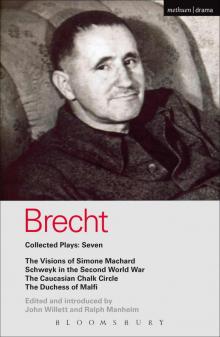 Bertolt Brecht: Mutter Courage und ihre Kinder 7
Bertolt Brecht: Mutter Courage und ihre Kinder 7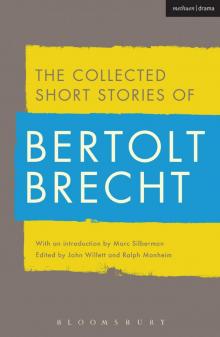 Bertolt Brecht
Bertolt Brecht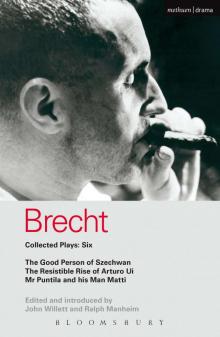 Bertolt Brecht: Mutter Courage und ihre Kinder 6
Bertolt Brecht: Mutter Courage und ihre Kinder 6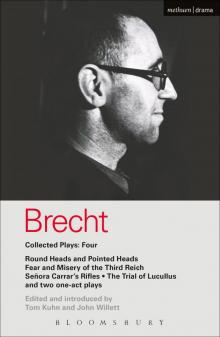 Bertolt Brecht: Mutter Courage und ihre Kinder 4
Bertolt Brecht: Mutter Courage und ihre Kinder 4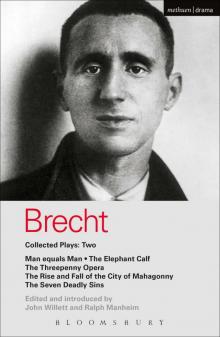 Bertolt Brecht: Mutter Courage und ihre Kinder 2
Bertolt Brecht: Mutter Courage und ihre Kinder 2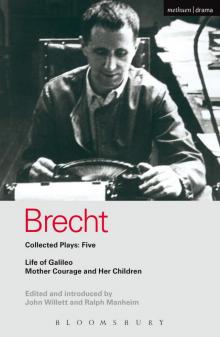 Bertolt Brecht: Mutter Courage und ihre Kinder 5
Bertolt Brecht: Mutter Courage und ihre Kinder 5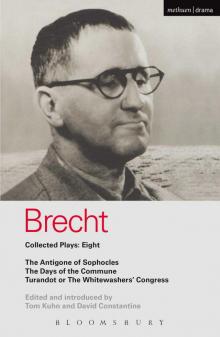 Collected Plays, Volume 4 (Bertolt Brecht: Plays, Poetry & Prose) 8
Collected Plays, Volume 4 (Bertolt Brecht: Plays, Poetry & Prose) 8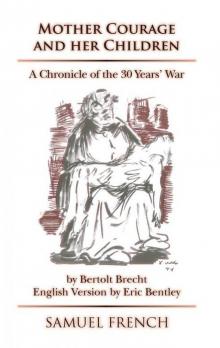 Mother Courage and Her Children
Mother Courage and Her Children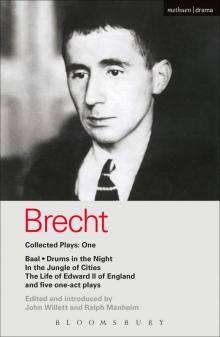 Bertolt Brecht: Mutter Courage und ihre Kinder 1
Bertolt Brecht: Mutter Courage und ihre Kinder 1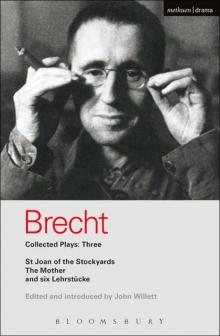 Brecht Collected Plays: 3: Lindbergh's Flight; The Baden-Baden Lesson on Consent; He Said Yes/He Said No; The Decision; The Mother; The Exception & the ... St Joan of the Stockyards (World Classics)
Brecht Collected Plays: 3: Lindbergh's Flight; The Baden-Baden Lesson on Consent; He Said Yes/He Said No; The Decision; The Mother; The Exception & the ... St Joan of the Stockyards (World Classics)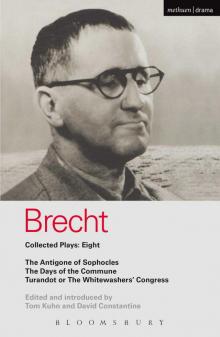 Brecht Plays 8: The Antigone of Sophocles; The Days of the Commune; Turandot or the Whitewasher's Congress: The Antigone of Sophocles , The Days of the Comm (World Classics)
Brecht Plays 8: The Antigone of Sophocles; The Days of the Commune; Turandot or the Whitewasher's Congress: The Antigone of Sophocles , The Days of the Comm (World Classics)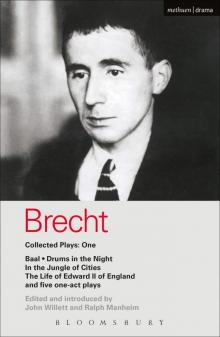 Brecht Collected Plays: 1: Baal; Drums in the Night; In the Jungle of Cities; Life of Edward II of England; & 5 One Act Plays: Baal , Drums in the Night , In the Jungle of Ci (World Classics)
Brecht Collected Plays: 1: Baal; Drums in the Night; In the Jungle of Cities; Life of Edward II of England; & 5 One Act Plays: Baal , Drums in the Night , In the Jungle of Ci (World Classics)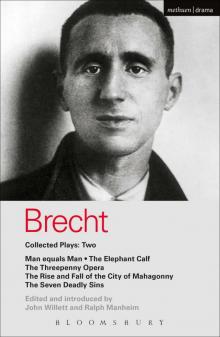 Brecht Collected Plays: 2: Man Equals Man; Elephant Calf; Threepenny Opera; Mahagonny; Seven Deadly Sins: Man Equals Man , Elephant Calf , Threepenny Ope (World Classics)
Brecht Collected Plays: 2: Man Equals Man; Elephant Calf; Threepenny Opera; Mahagonny; Seven Deadly Sins: Man Equals Man , Elephant Calf , Threepenny Ope (World Classics)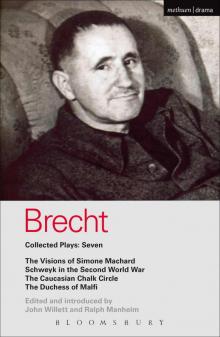 Brecht Collected Plays: 7: Visions of Simone Machard; Schweyk in the Second World War; Caucasian Chalk Circle; Duchess of Malfi (World Classics)
Brecht Collected Plays: 7: Visions of Simone Machard; Schweyk in the Second World War; Caucasian Chalk Circle; Duchess of Malfi (World Classics)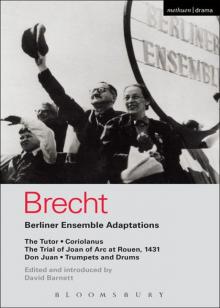 Berliner Ensemble Adaptations
Berliner Ensemble Adaptations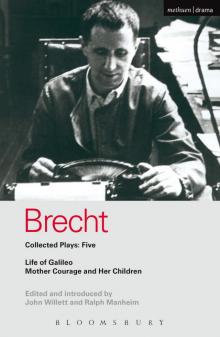 Brecht Collected Plays: 5: Life of Galileo; Mother Courage and Her Children (World Classics)
Brecht Collected Plays: 5: Life of Galileo; Mother Courage and Her Children (World Classics)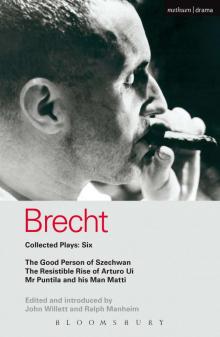 Brecht Collected Plays: 6: Good Person of Szechwan; The Resistible Rise of Arturo Ui; Mr Puntila and his Man Matti (World Classics)
Brecht Collected Plays: 6: Good Person of Szechwan; The Resistible Rise of Arturo Ui; Mr Puntila and his Man Matti (World Classics)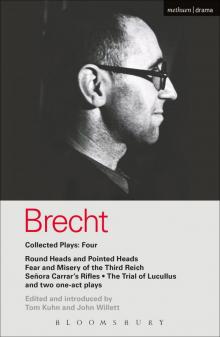 Brecht Collected Plays: 4: Round Heads & Pointed Heads; Fear & Misery of the Third Reich; Senora Carrar's Rifles; Trial of Lucullus; Dansen; How Much Is ... and Misery , Carr (World Classics)
Brecht Collected Plays: 4: Round Heads & Pointed Heads; Fear & Misery of the Third Reich; Senora Carrar's Rifles; Trial of Lucullus; Dansen; How Much Is ... and Misery , Carr (World Classics)